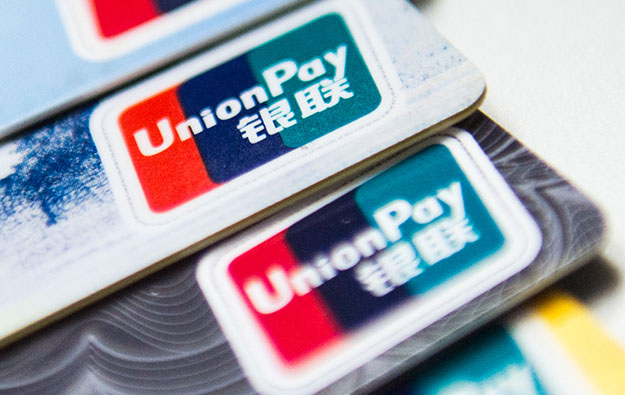UnionPay cash use a risk to Macau premium mass: study
Sep 14, 2017 Newsdesk Latest News, Macau, Philippines, Top of the deck

The dependence on China UnionPay Co Ltd cards for cash as a source of gambling funds in the Macau market has increased and poses a risk to the premium mass segment, according to a Wednesday note from Morgan Stanley, citing proprietary research.
The investment bank’s memo is based on a survey of 1,000 Chinese gamblers, conducted by AlphaWise, a research unit of Morgan Stanley.
Industry analysts say premium mass-market players account for the top end of the mass market, playing at higher denominations than the market average. They are generally held to yield high margins because casinos don’t need to pay commissions to junket operators to get such players’ business.
“The dependence on UnionPay cards (both debt and credit) relative to cash on hand as a source of gambling funds has increased compared to the last two years,” noted Morgan Stanley. “As much as 70 percent of gambling funds are sourced through UnionPay cards for customers gambling higher sums, compared to 66 percent in 2016 and 60 percent in 2015.”
The institution said recent restrictions on the use of mainland China-issued UnionPay bank cards in Macau poses “increased risk for this [premium mass] segment”.
Macau recently tightened cash withdrawal rules for holders of mainland China-issued UnionPay bank cards. As of July 4, Macau suspended cash withdrawals for holders of such bank cards at those automated teller machines (ATMs) that do not yet have “know your customer” (KYC) technology.
The new rule for these UnionPay bank cards, coupled with the annual cash withdrawal limit at overseas ATMs of RMB100,000 (US$15,290), “will continue to reduce usage of cash and increase the usage of UnionPay cards in pawnshops,” suggested Morgan Stanley.
“Any potential clampdown on the usage of debit/credit cards in future remains a risk to premium mass business,” the institution added.
The survey also suggested that an increasing amount of mass customers are interested in gambling in other destinations – particularly in Las Vegas, Singapore, and Australia – in the next 12 months.
“In the next 12 months, the percentage of frequent travellers – those intending to visit Macau four or more times per year – has declined from 48 percent in 2015 to 13 percent in 2017,” according to Morgan Stanley’s note.
Macau nonetheless remains the top casino gaming destination among Chinese gamblers surveyed, with about 70 percent of the Chinese gamblers quizzed reporting having gambled there “in the last 12 months and [having] intention to gamble [there] in the next 12 months”.
The survey however pointed to the rising popularity for Chinese of overseas gambling destinations.
“In the last 12 months, Singapore was the most popular gambling destination for Chinese gamblers in Asia outside of Macau,” said Morgan Stanley, based on the findings of the survey. “In the next 12 months, all markets outside of Macau showed a higher percentage of Chinese gamblers intending to gamble, with more significant jumps in Las Vegas, Singapore, Australia, and Malaysia,” it added.
According to the survey, the Philippines is “the least preferred” gambling destination for Chinese gamblers. But Morgan Stanley said it expects that to change starting in 2017.
“We expect growth of Chinese visitor arrivals in the Philippines to accelerate in the next few years. This is driven by the improved geopolitical relationship between China and the Philippines, and visas on arrival granted to Chinese visitors (tour groups) in August – which could soon become visa-free, in our view,” noted the institution.
Related articles
-
 RGB says ‘unaffected’ by...
RGB says ‘unaffected’ by...Jul 26, 2024
-
 Sands China 2Q EBITDA down q-o-q amid...
Sands China 2Q EBITDA down q-o-q amid...Jul 25, 2024
More news
-
 Donaco EBITDA up y-o-y to above US$4mln...
Donaco EBITDA up y-o-y to above US$4mln...Jul 26, 2024
-
 HK listed Palasino upgrades Czech...
HK listed Palasino upgrades Czech...Jul 26, 2024
Latest News
Jul 26, 2024
Border-casino operator Donaco International Ltd has achieved a 164.17-percent year-on-year increase in its latest quarterly group earnings before interest, taxation, depreciation and amortisation...Sign up to our FREE Newsletter
 (Click here for more)
(Click here for more)
Pick of the Day
”We’ve got more traction outside of Macau at the moment. But Macau’s going be a bigger focus for us”
David Punter
Regional representative at Konami Australia
Most Popular
 Sheraton brand to exit Londoner Macao, to be Londoner Grand July 25, 2024
Sheraton brand to exit Londoner Macao, to be Londoner Grand July 25, 2024  Macau regulator probes unlicensed gaming agents July 24, 2024
Macau regulator probes unlicensed gaming agents July 24, 2024  Philippines gives 20k aliens in POGOs 60 days to leave July 25, 2024
Philippines gives 20k aliens in POGOs 60 days to leave July 25, 2024  Philippines-listed DigiPlus says not affected by POGO ban July 24, 2024
Philippines-listed DigiPlus says not affected by POGO ban July 24, 2024  Sands China 2Q EBITDA down q-o-q amid low hold, renovation July 25, 2024
Sands China 2Q EBITDA down q-o-q amid low hold, renovation July 25, 2024






